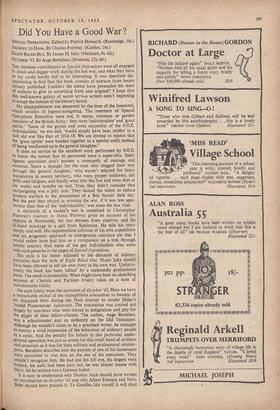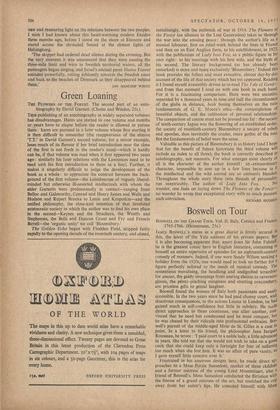Did You Have a Good War?
SPECIAL OPERATIONS. Edited by Patrick Howarth. (Routledge, 16s.) THE nineteen contributors to Special Operations were all engaged in cloak-and-dagger work during the last war, and what they have to say could hardly fail to be interesting. It was therefore dis- appointing to find that the book consists of extracts from books already published. Couldn't the editor have persuaded his team of authors to give us something fresh and original? I hope that this well-known galaxy of secret service writers aren't beginning to scrape the bottom of the literary barrel.
My disappointment was deepened by the tone of the foreword, which smacks of legend-mongering. The members of Special Operations Executive were not, it seems, common or garden members of the British Army : they were 'individualists' and 'great spirits.' Some of the gayest and most successful of the S.O.E. individualists,' we are told, 'would simply have been misfits' in a dull old war like that of 1914-18. We are invited to rejoice that the 'great spirits' were banded together in a special outfit instead of being 'swallowed up in the general slaughter.'
It does no service to the excellent work performed by S.O.E. to foster the notion that its personnel were a super-elite. Intel- ligence specialists don't possess a monopoly of courage and resource. Spare a thought for the men who slogged their way through 'the general slaughter,' who weren't selected for fancy manoeuvres in enemy territory, who wore proper uniforms, did drills and fatigues, and finally went into the line and were shot at for weeks and months on end. True, they didn't consider that campaigning was a jolly lark. They lacked the talent to reduce modern warfare to the dimensions of a Boy Scouts' field day. But the part they played in winning the war, if it was less spec- tacular than that of the 'individualists,' was none the less vital.
A chronicle of a ranker's war is contained in Christopher Portway's Journey to Dana. Portway gives an account of his capture in Normandy, his two escapes from captivity and his ill-fated marriage to a girl from Kralovice. He tells his story simply and well. His unpretentious estimate of his own capabilities and his pragmatic approach to emergencies convince me that I would rather have had him as a companion on a trek through hostile country than some of the gay individualists who write with such panache in the pages of Special Operations.
His style is far better adjusted to the demands of military narrative than the style of Eight Baled Out. Major Inks should have been allowed to tell his own story in his own way. Unfortu- nately the book has been 'edited' by a supposedly professional hand. The result is lamentable. What might have been an absorbing account of Chetnik and Partisan rivalry takes on a note of melodramatic falsity.
No such falsity mars the narration of October '43. Here we have a remarkable recital of the surreptitious evacuation to Sweden of six thousand Jews during the Nazi attempt to render Hitler's 'model Protectorate' it/den/vim The evacuation was carried out largely by non-Jews who were stirred to indignation and pity for the plight of their fellow-citizens. The author, Aage Bertelsen, was a schoolmaster and an authority on the Old Testament. Although he wouldn't claim to be a practised writer, he manages to convey a vivid impression of the behaviour of ordinary people in a crisis. And the penalty for failure in this particular under- ground operation was just as severe for this small band of civilians and amateurs as it was for their military and professional counter- parts. Bertelsen describes how the parents of one of his lieutenants were permitted to visit him on the eve of his execution. They couldn't recognise him. He had lost his left eye, his fingers were broken, his nails had been torn out, he was almost insane with thirst. All he wanted was a German bullet.
It is easy to understand why Sholem Asch should have written an introduction to October '43 and why Albert Einstein and Niels. Bohr should have praised it. To Gentiles like myself it will shed
new and reassuring light on the relations between the two peoples. I wish I had known about this heart-warming modern Exodus three months ago, before I stood on the shore at Elsinore and stared across the shrouded Sound at the distant lights of Helsingborg.
The skipper had ordered dead silence during the crossing. But the very moment it was announced that they were passing the three-mile limit and were in Swedish territorial waters, all the passengers began singing, and Israel's ancient pavan Shema Yisroel sounded powerfully, rolling jubilantly towards the Swedish coast and back to the beaches of Denmark as they disappeared behind











































 Previous page
Previous page